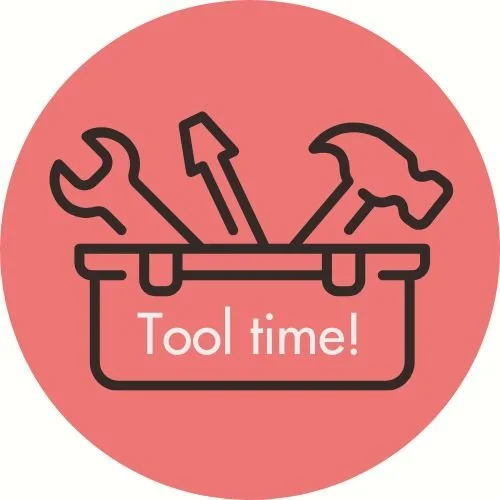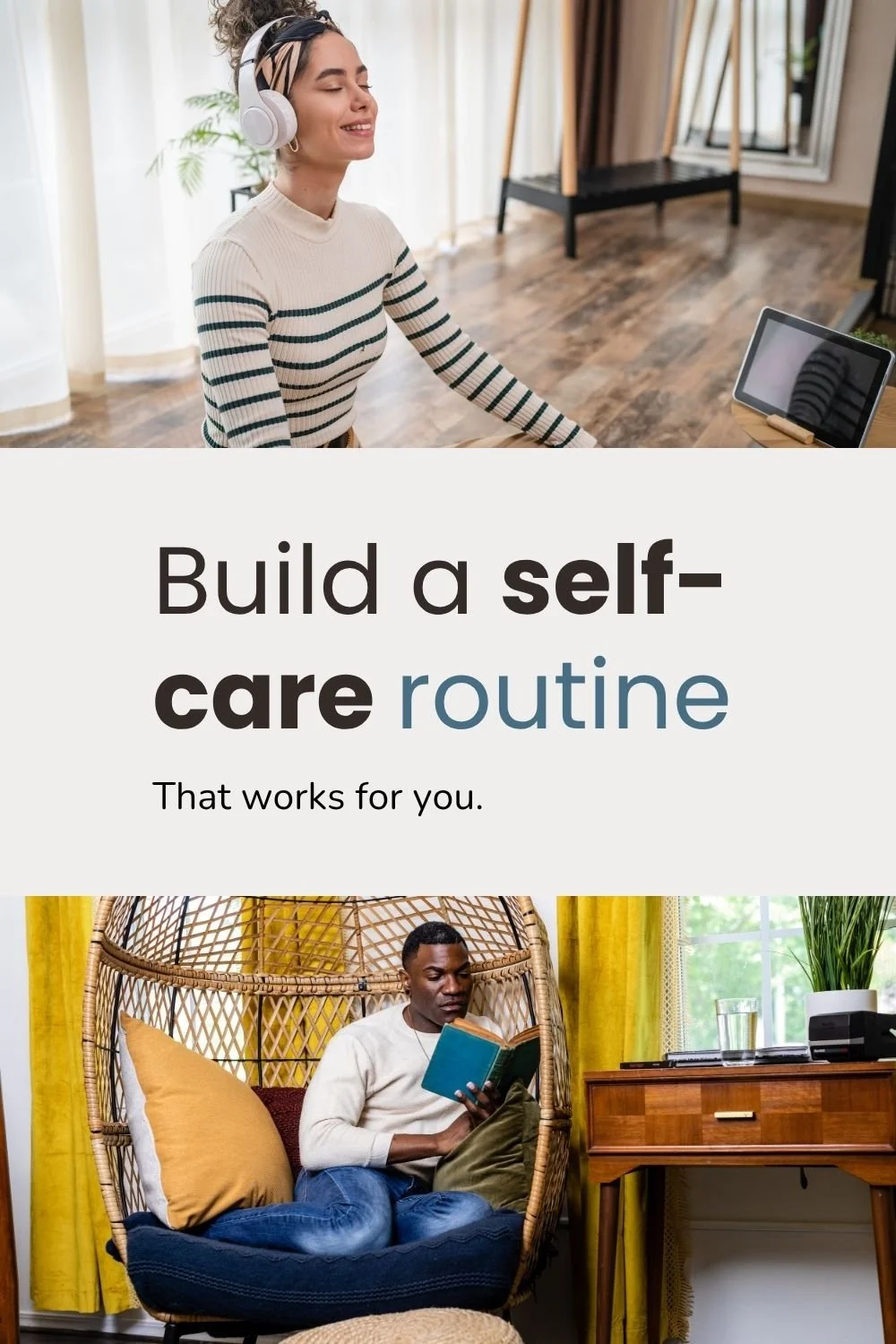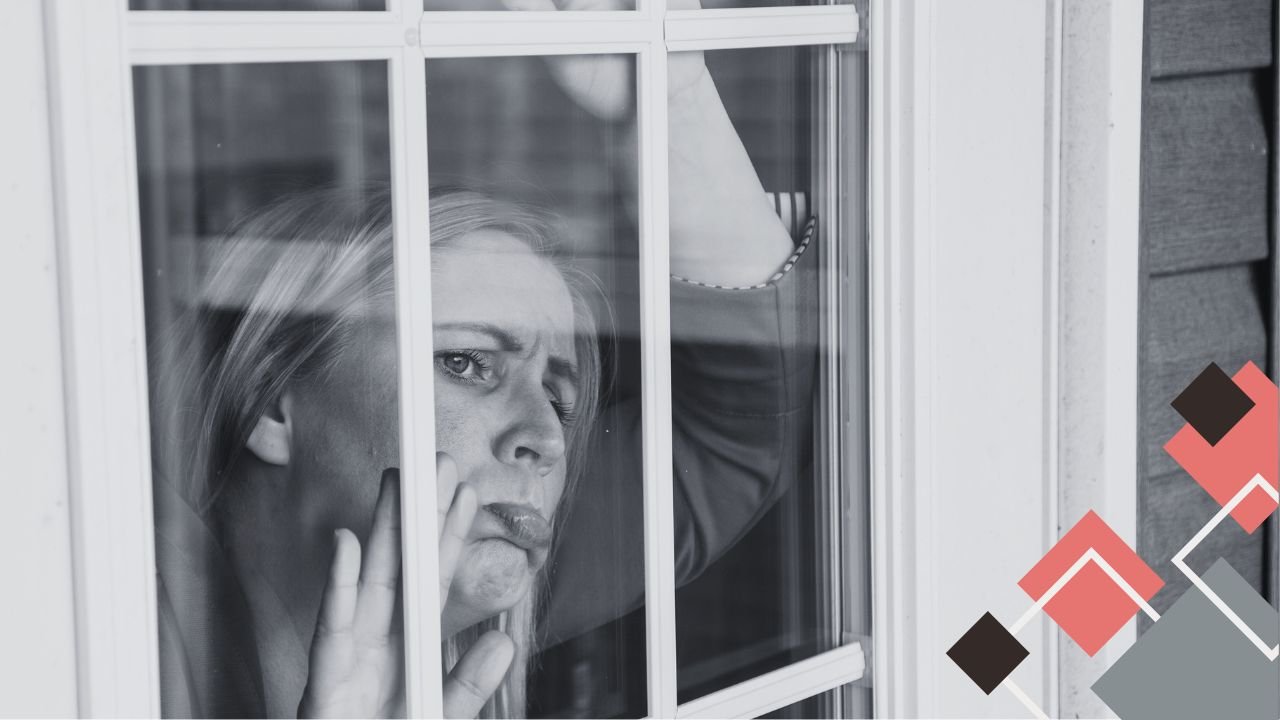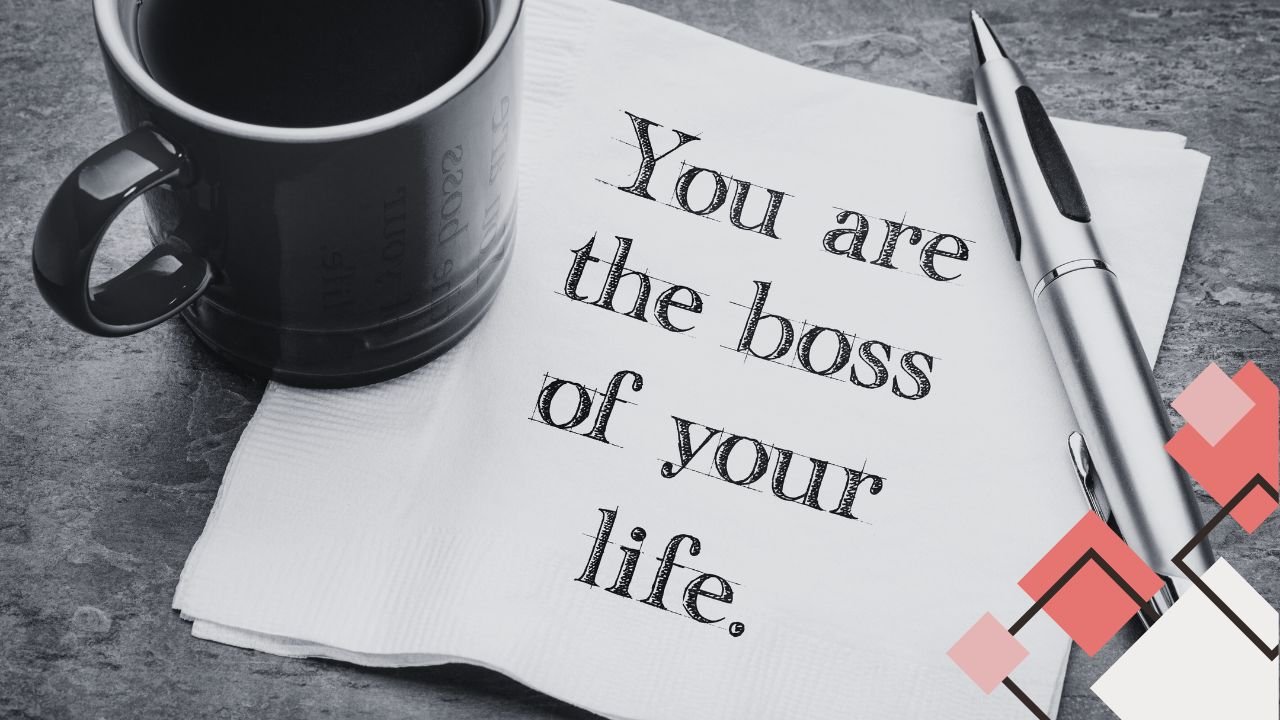Build a personalized self care routine that’s easy to maintain
This page is designed to help you recognize what kind of self-care actually fits your life, not an ideal version of it.
This guide isn’t theory. It’s shaped by years of coaching sessions, real conversations, and the practical shifts that people tested until they found what actually works.
Self-care isn’t supposed to feel like another thing on your to-do list.
But for many people, that’s exactly what happens. They try to copy someone else’s perfect morning routine, push too hard at the start, or avoid it altogether because they’re already stretched thin.
My goal is to help you build a routine that feels personal, doable, and most importantly, easy to maintain.
Before we dive in, here are the most common struggles people share when it comes to self care. Scan the list of reasons below and click the one that feels most like you to jump to that section:
You can jump straight to the one that speaks to you most or read them in order as a step-by-step path.
“I don’t know what self-care even means.”
Self-care is often portrayed as a luxury (think long bubble baths and spa days). While spa days can be wonderful, true self-care means carving out time regularly to attend to your mental, emotional, and physical health. This can be as simple as ensuring you get enough sleep, choosing nutritious foods, or setting aside a few minutes daily to meditate or journal.
These practices won’t just help you unwind; they’ll make you more resilient and effective in all areas of your life.
Think of yourself as your best investment. When you invest time in self-care, it helps you manage stress, boosts your mental health, and enhances your overall well-being. Ignore it too long, though, and you’ll start seeing burnout, low self-esteem, and a general feeling of “blah.”
Self-care isn’t just about pampering yourself (though that’s nice too!); it means doing things that bring you joy, setting boundaries to protect your energy, and working on your personal growth. Imagine starting each day feeling refreshed and ready to go. That’s what real self-care can do for you.
In our hectic lives, with jam-packed schedules and never-ending duties, self-care tends to take a backseat. However, skipping out on self-care is more than just a small slip; it's a lost chance to boost your overall well-being and life satisfaction. That's why creating a self-care routine is not just important, it's vital.
A lot of people quietly wonder if they’re “doing self-care wrong.” If that’s you, you’re not alone. For years, self-care has been marketed as spa days, bubble baths, and expensive face masks. Nice? Sure. Necessary? Not at all.
At its core, self-care is anything you do on purpose to recharge your mind, body, or emotions. It doesn’t have to cost money, and it doesn’t have to look pretty for Instagram. If it helps you reset, restore, or feel more like yourself, it counts.
Think of it this way: your phone can charge in lots of ways: wall plug, car charger, portable battery. None of them is “wrong.” What matters is that it gets recharged. Self-care works the same way. Whether it’s a nap, calling a friend, or watering your plants in silence, if it leaves you with more energy than you had before, that’s self-care.
The compounding benefits of regular self-care
The benefits of establishing your self-care routine are profound and far-reaching:
Increased productivity: When you take care of your health and well-being, you can perform better in all areas of your life. Regular self-care reduces stress and prevents burnout, which means you can maintain your performance without sacrificing your health.
Enhanced self-esteem: Self-care routines reinforce your value through consistent actions that say "I am worth the effort." This can dramatically improve how you feel about yourself and your life.
Better physical health: Many self-care activities, like exercise and healthy eating, directly improve your physical health, reducing the risk of many illnesses and boosting your energy levels.
Emotional resilience: Regular self-care helps you manage stress and lowers your susceptibility to anxiety and depression. By taking care of your emotional and mental health, you can face life's challenges with greater calm and clarity.
Prioritizing self-care is crucial for maintaining overall well-being. Failing to give yourself the necessary attention and care can lead to physical, emotional, and mental health issues. Neglecting self-care can result in increased stress, burnout, decreased productivity, and heightened vulnerability to illnesses.
Over time, neglecting self-care can also impact relationships, job performance, and overall quality of life. Remember, taking care of yourself isn’t selfish; it’s necessary.
A client of mine, Jenna, told me, “I don’t do self-care at all.” But when we unpacked her day, she realized her nightly novel-reading and Friday pizza nights with her kids already counted as self-care. Why? Because she looked forward to those things, and they were restful activities for her. She wasn’t failing at taking care of herself; she just didn’t recognize it.
Start with these quick wins
Redefine it: Self-care is anything I do on purpose to recharge my mind, body, or emotions. Let’s start by stripping away the noise and reconnecting with what self-care actually means for you.
Ask yourself these questions:What activities leave me feeling calm, nourished, or recharged?
What parts of my routine deplete me, and where can I shift?
What’s one self-care habit I’ve tried to start before? What got in the way?
List 5 things you already do that leave you feeling better.
Pick one and protect it this week. It’s already working for you.
“I start strong but quit after a week.”
You’re not broken for “losing motivation.” What usually happens is that the routine you started with was built for an imaginary version of your life, one where nothing unexpected pops up, and you magically have extra energy. Real life doesn’t work like that.
Think of it like training for a marathon: if you sprint in the first mile, you’ll burn out quickly. But if you start with a sustainable pace, you’ll finish strong. Self-care is the same. The problem isn’t you, it’s the pace you set.
Here’s the shift: Instead of aiming for perfection, aim for repeatability. Start with one or two small habits you can imagine doing even on your most chaotic days. Think brushing your teeth while listening to a calming playlist, taking a two-minute stretch at your desk, or writing a single line in your journal. When those tiny steps become automatic, you can add more.
Self-care that lasts isn’t about pushing yourself harder; it’s about finding a rhythm that doesn’t break when life gets messy.
A client of mine, Sarah, bought a beautiful journal and vowed to herself to write three pages daily. By Day 5, it was gathering dust. Once she switched to writing one single line at night, she was able to stick with it and often ended up writing more.
Start with these quick wins
Shrink the habit: Cut your plan in half until it feels laughably small.
Pair it with something automatic (stretch while coffee brews).
Create a “minimum version” for chaotic days (Take two deep breaths rather than skipping it altogether).
“I don’t have time for self-care.”
How much time do you spend each week waiting in line?
This is the #1 excuse people give, and I say “excuse” lovingly because it’s usually covering up something deeper. What people often mean is: “I don’t have time for the version of self-care I think I’m supposed to be doing.” Like 60 minutes of yoga, a full skincare routine, or a long bath with candles.
But self-care doesn’t have to be an “extra activity” you tack onto an already overloaded day. It can be something you weave into what you’re already doing.
Waiting for your coffee? Do a one-minute breathing reset.
Stuck on hold? Step outside for fresh air.
Prepping dinner? Put on a song that lifts your mood and call it a reset break.
The truth is, you don’t need a big block of time; you need small, intentional moments sprinkled through your day. Even a few minutes can shift how you feel if you actually let yourself take them.
Self-care is not about “finding more hours.” It’s about reclaiming the ones you already have.
Jason, a dedicated dad of two, often felt completely maxed out by the demands of his busy life. However, when we carefully examined how he spent his day, we discovered several hidden pockets of time: moments waiting in the school pickup line, quietly stirring dinner on the stove, and those few minutes right before his first work call. By intentionally using these brief moments as “mini resets,” Jason experienced a remarkable shift in his energy and focus, transforming his entire day for the better.
Start with these quick wins
Use transition moments (reset between work and dinner, or before bed).
Stack it on something automatic (practice gratitude while brushing your teeth).
Set a one-song timer (3 minutes of movement or deep breathing).
“I feel guilty taking time for myself.”
This one stings because guilt has a way of making you feel like you’re choosing yourself instead of the people or responsibilities that matter. But here’s the truth: when you’re constantly running on empty, you’re not giving anyone your best self, you’re giving them what’s left.
Imagine your energy like a phone battery. You wouldn’t expect your phone to run for days without charging, right? Yet somehow, we expect ourselves to function without pausing to recharge. And when we finally collapse, we wonder why we couldn’t “handle it all.”
The reframe: self-care isn’t selfish, it’s responsible. It’s how you stay steady enough to show up for others. Taking 15 minutes to recharge doesn’t make you a bad partner, parent, or colleague. It makes you more present, patient, and grounded when you return.
The guilt won’t disappear overnight, but each time you choose a small act of care, you teach yourself that the world doesn’t fall apart when you pause. And slowly, that permission grows stronger than the guilt.
Maria resisted evening walks because she thought it was selfish. When I convinced her to try them anyway, she came back home calmer and more patient, and her family noticed. Her guilt eased once she saw the difference it made.
Start with these quick wins
Reframe it: Self-care isn’t selfish, it’s maintenance.
Start ridiculously small (5 minutes to prove the world doesn’t collapse).
Ask for buy-in from a partner or friend. It normalizes your care.
“How do I build a self-care routine I’ll actually stick to?”
The short answer: Stop trying to copy someone else’s. The routines you see on Instagram might look inspiring, but if they don’t fit your life, they won’t last.
What actually works is personalization. That means:
Match the timing to your natural rhythms. (If you hate mornings, stop forcing 5 a.m. yoga.)
Choose activities that feel good, not ones you “should” do. (If journaling drains you, try a walk instead.)
Plan for messy days. (Have a 2-minute version of your routine for when life explodes.)
Think of your self-care routine as a menu, not a script. On a good day, you might do the longer version. On a rough day, you can pick something short. Either way, you’re consistent.
The goal isn’t to follow a flawless checklist. It’s to create a rhythm that feels like it belongs to you. That’s what makes it stick.
A client of mine, David, had experimented with dozens of popular morning routines, but none of them ever stuck or felt natural to him. Once he shifted his focus to a simple, after-dinner 30-minute protected hobby time that aligned perfectly with his natural night-owl rhythm, he finally found a routine he could consistently maintain and enjoy.
Start with these quick wins
Choose your best time (morning person? night owl? match it).
Build a menu, not a schedule (flexibility beats rigidity).
Test for a week, then tweak instead of scrapping.
TOOLS & RESOURCES
Books worth exploring:
*Self-Care Activities for Women: 101 Practical Ways to Slow Down and Reconnect With Yourself by Cicely Horsham-Brathwaite PhD
*Listen Bitch Affirmation Journal | A Daily Journal To Help You Conquer The Sh*t Out of Every Day by Listen Bitch TM
*Self-Care for Autistic People: 100+ Ways to Recharge, De-Stress, and Unmask! by Dr. Megan Anna Neff
*Heads-up: Some of the links on this page are affiliate links, which means I may earn a small commission if you choose to make a purchase, at no extra cost to you. I only recommend tools and resources I genuinely believe are helpful. Thank you for supporting the work I do here.
“How can I balance mental, emotional, and physical self-care?”
When most people think “self-care,” they picture only one slice, usually something physical like skincare or exercise. But your whole well-being rests on three pillars:
Mental care: resting your brain, reducing overwhelm, staying focused.
Emotional care: processing feelings, staying connected, nurturing joy.
Physical care: movement, nourishment, sleep, and body maintenance.
If one pillar is ignored, the others eventually wobble. You might eat well and exercise, but if you’re emotionally drained, it will catch up with you. Or you might journal daily, but if you’re sleep-deprived, your brain won’t function well enough to benefit.
The key: Balance doesn’t mean doing everything every day. It means checking in regularly: “Which area feels most neglected right now?” and giving that one a little love. Maybe this week you can focus on sleep. Next week, make time for a friend who always lifts you up.
Think of it like spinning plates. The goal isn’t to spin them all perfectly at once; it’s to notice when one’s slowing down and give it a little push before it crashes.
Lena (a client) was totally dedicated to her workouts, always showing up and giving it her all. Yet, she often felt completely wiped out. It turns out, focusing only on physical care wasn’t enough. When she started scheduling weekly coffee dates with close friends, she gave her emotional health a boost. And by carving out just ten minutes daily for quiet reflection, her mental well-being got the attention it deserved. That little shift helped Lena finally feel balanced and recharged. Sometimes, it’s the simple, intentional habits outside the gym that make all the difference.
Start with these quick wins
Do a weekly check-in: Which pillar is most neglected?
Pick one small action for that area (call a friend, read a chapter, stretch).
Rotate your focus weekly. No need to juggle everything at once.
Share this guide on Pinterest.
Self care isn’t about chasing the “perfect” routine. It’s about creating something personal, flexible, and sustainable. Start with one small win, then build from there.
Start where you are. Protect one thing that restores you this week, even if it takes only five minutes. Small, consistent care adds up and it’s far more powerful than waiting for the “perfect” routine to appear.
FAQ: Questions my clients ask
-
There’s no magic number. Some days you’ll have 30 minutes, other days you’ll have 3. What matters is that you’re consistent with something. Even short moments (like a deep breath before your next call) can count.
-
You will, and that’s normal. The key is to have a “minimum version” of your routine you can always come back to. Instead of scrapping your plan, ask: What’s the smallest step I can do right now? Then build back up when you can.
-
Not at all. Self-care isn’t about adding more to your plate; it’s about protecting your energy so you can handle what’s already there. Many of the best self-care practices take just a few minutes.
-
Nope. Think of it more like a menu than a script. Some days you might choose a walk, others you might journal or rest. Flexibility actually helps you stick with it long term.
-
Ask yourself: Does this recharge me mentally, emotionally, or physically? If the answer is yes, it counts. It’s not about how it looks from the outside, it’s about how it feels to you.
-
This can be tough. Start small and explain why it matters. Sometimes framing it as “recharging so I can show up better” helps. If you can, involve them too: invite your partner or kids into simple routines like walks, music breaks, or gratitude rituals.
















Feel like life is just one big game of catch-up? It’s time to stop reacting and start running the show. Here’s how to take control before life takes control of you.